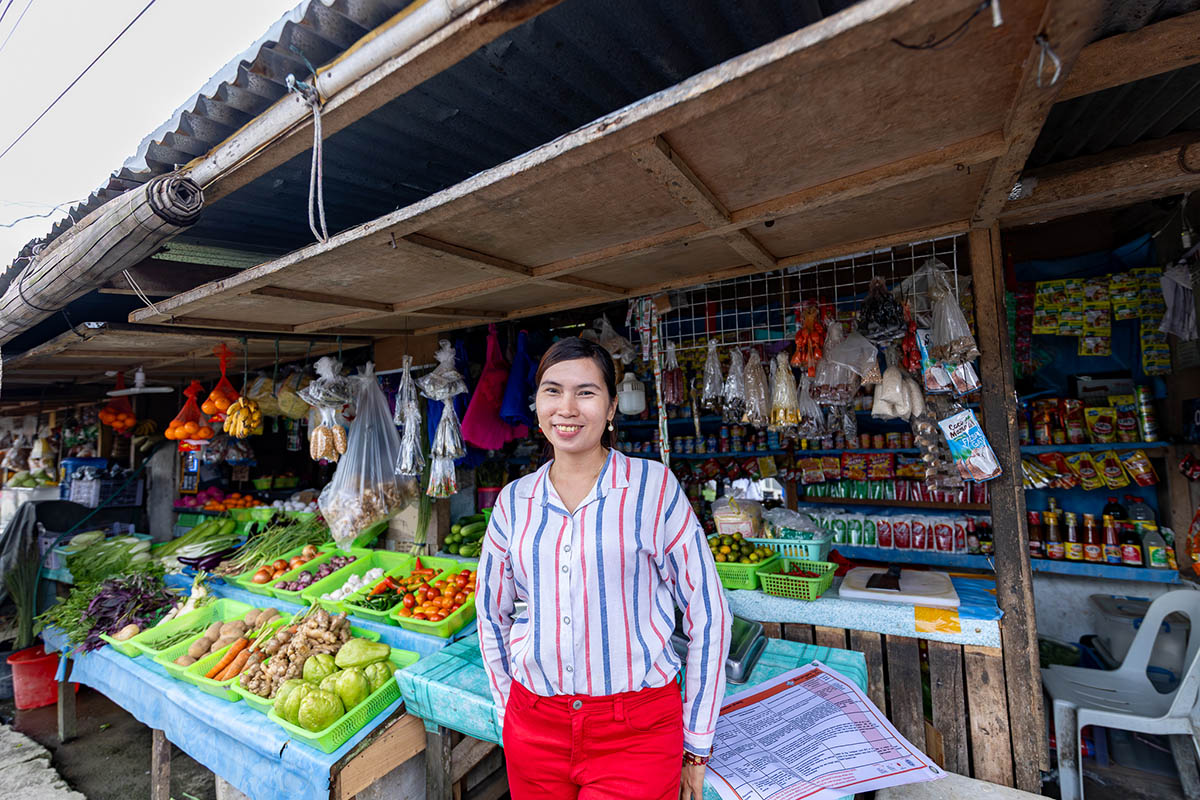
(Cover photo: Joy Chio Ambojia, a microentrepreneur from Ormoc City, stands in front of her talipapa stall. She is among the participants of the Micro Enterprise Resiliency Program (MERP) training.)
On a busy stretch of highway in Barangay Ipil, Ormoc City, a small talipapa stands out—not just for its wide selection of goods, but for the energy of its vendor, Joy Chio Ambojia. Her dedication has earned her a loyal following of suki or regular customers.
“Excellent customer service at dapat lagi kang handa (you should always be prepared),” Joy shared, as she assisted customers with practiced ease.
Joy is one of the microentrepreneurs who joined the Microentrepreneurs Resilience Program (MERP) led by A-PAD Philippines, designed to equip microentrepreneurs with disaster preparedness, emergency savings, inventory management, and business continuity planning.
Joy began her small business in January 2021, determined to provide for her family and serve her community after the economic challenges of the pandemic. For her, readiness is not just a business strategy but also a personal commitment to her family and community.
“Kailangan talaga namin maging matatag kasi, aside sa kami nakasalalay dito ang aming hanapbuhay, yung community din namin ay nakasalalay din sa amin (We really need to be strong because, aside from our livelihood depending on this, our community also relies on us),” she added.
After the training, Joy began implementing practical measures to strengthen her store’s disaster readiness. She now maintains additional food stocks, sets aside emergency funds, and plans supply needs for up to two weeks during typhoon season.
“Kapag may bagyo, kailangan meron ka pa ring maibenta. At hindi lang para sa pamilya mo, kundi sa mga kapitbahay na nangangailangan rin (When there’s a typhoon, you still need to have something to sell. And not just for your family, but also for neighbors who are in need),” she said.
Baking Through the Storms

In Brgy. Cogon, bakery owner Lolito Eisola echoes this mindset. His 15-year-old shop has survived multiple calamities, including Super Typhoon Yolanda. “Dapat tayong handa araw-araw. Hindi lang tuwing may kalamidad. Saka na ba tayo maghahanda pag andyan na? Edi huli na ang lahat (We should be prepared every day—not just during disasters. Will we only start preparing when it’s already here? Then it would be too late)”
Lolito recalled preparing for Yolanda by storing sacks of rice and flour in water drums and placing them on higher ground. After the storm, the bakery became a critical food source, with even more customers coming in than before.
Lolito, a former barangay official, continues to build his preparedness skills. Through MERP, he gained access to new tools and early warning systems.
These initiatives come at a crucial time. Ormoc City sits in a high-risk zone susceptible to flooding, landslides, storm surges, and frequent typhoons, according to City Disaster Risk Reduction and Management Officer Ciriaco Tolibai II
“Microenterprises aren’t just reopening businesses after disasters—they’re rebuilding hope,” said A-PAD Philippines Board Member Elmer Lorenzana. “MERP is anchored in the realities of microentrepreneurs and local communities. It empowers them not only to sustain their businesses, but to lead resilience efforts where they’re rooted.”
Ormoc currently has an estimated 7,000 to 8,000 registered businesses—most of them microenterprises—based on data from the Local Economic Development and Investment Promotions Office (LEDIPO).
MERP continues to roll out training through partnerships with local institutions. “We envision a more empowered Ormocanon business sector,” said LEDIPO’s Cheryl Gallo. “Not just with livelihoods that meet daily needs, but with enterprises that can expand, thrive, and endure—even when calamities strike.”